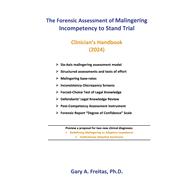
The Forensic Assessment of Malingering Incompetency to Stand Trial Clinician's Handbook
by Freitas, Ph.D., Gary A.Buy New
Rent Textbook
Used Textbook
We're Sorry
Sold Out
eTextbook
We're Sorry
Not Available
Summary
This Clinician's Handbook is geared toward assisting 1) private practitioners consulting with the courts, county attorney, public defender, and defense attorneys, and 2) employees of mental health programs, including correctional mental health treatment programs (jails and prisons), restoration to competency programs, state hospitals, and community inpatient mental health programs.
Included in this handbook are the necessary clinical tools for assessing malingering and a defendant-patient's competency to stand trial––relevant legal statutes, malingering base-rates, inconsistency-consistency response screens, structured assessment instruments of legal knowledge, test-of-effort to detect malingering, sample forensic evaluations, review of forensic guidelines, research overview, an analysis of available and tests-of-effort that have become a required element of this evaluation process, as well as an in-depth exploration of the complex motivation to malinger symptoms of a mental illness, including primary, secondary, and tertiary motivating factors.
Here is the real bottom line. Diagnosing malingering has been and continues to be highly controversial and poses significant challenges for evaluators. While there are always significant legal consequence for defendants, not diagnosing it often poses serious legal and social consequence for families and the community as well. As a result, this diagnoses will remain forever controversial and test forensic evaluators to become more competent themselves. This handbook is designed to assist evaluators in becoming more articulate in their report writing and in testifying before the court.
As a side note, I would also speculate that it may be time to do away with the archaic term malingering, not just because of its many negative connotations, but because the issues before us are more complex than this diagnosis is capable of conveying. Perhaps it would be better if we were more focused on descriptive, behavioral patterns of deception and non-cooperation. Towards this possibility, in Section-E, I propose an alternative diagnosis I term Adaptive Impedance. It is theoretical and speculative with the goal of a diagnostic paradigm-shift—enjoy! I also offer a second experimental diagnosis termed Institutional Adaptive Syndrome. This an exploration of how hospitalized psychiatric patients uniquely adapt to their environments in terms that require a new diagnostic understanding. Good luck!
Author Biography
Dr. Freitas has worked as a consultant, clinician, supervising psychologist and program director for state and county forensic programs in CA and AZ for the past thirty-five years. Throughout his career he has specialized in the risk assessment of criminal defendants (not guilty by reason of insanity, incompetent to stand trial, mentally disordered sex-offenders, death penalty mitigation, mentally disordered violent offenders and life-term parolees). He is also author of Defusing Violence in the Workplace (1994).
An electronic version of this book is available through VitalSource.
This book is viewable on PC, Mac, iPhone, iPad, iPod Touch, and most smartphones.
By purchasing, you will be able to view this book online, as well as download it, for the chosen number of days.
Digital License
You are licensing a digital product for a set duration. Durations are set forth in the product description, with "Lifetime" typically meaning five (5) years of online access and permanent download to a supported device. All licenses are non-transferable.
More details can be found here.
A downloadable version of this book is available through the eCampus Reader or compatible Adobe readers.
Applications are available on iOS, Android, PC, Mac, and Windows Mobile platforms.
Please view the compatibility matrix prior to purchase.
